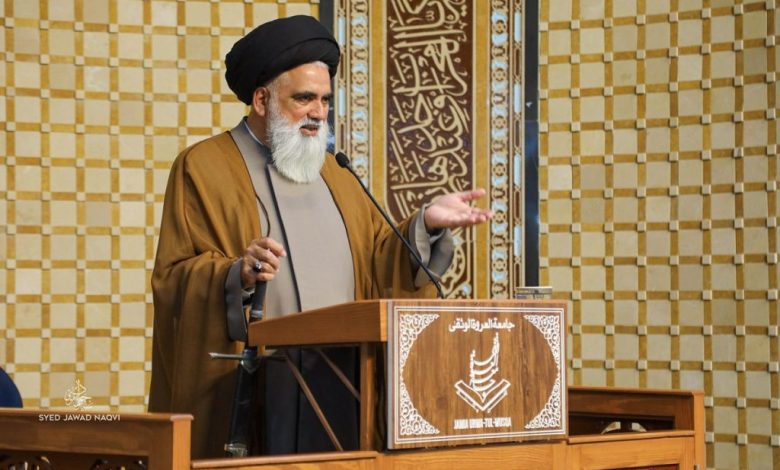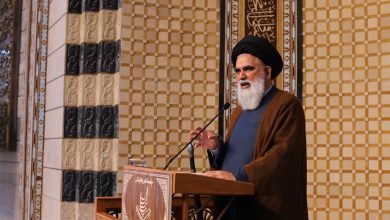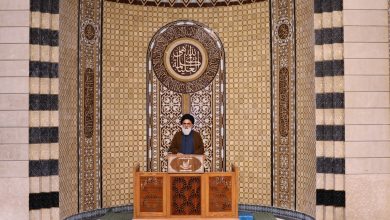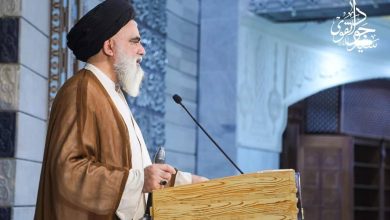
Hujjatul Islam Ustad Syed Jawad Naqvi
(Principal Jamia Orwatul Wuthqa – Lahore)
Delivered at: Masjid Baitul ul Ateeq
Lahore – Pakistan
Friday Sermon 23rd May – 2025
Sermon 1: Furqan (Criterion) comes from two sources: Intellect and Quran
Sermon 2: Protect your children from the Fitnah of Ghuluw
يَا أَيُّهَا الَّذِينَ آمَنُوا إِن تَتَّقُوا اللَّهَ يَجْعَل لَّكُمْ فُرْقَانًا وَيُكَفِّرْ عَنكُمْ سَيِّئَاتِكُمْ وَيَغْفِرْ لَكُمْ ۗ وَاللَّهُ ذُو الْفَضْلِ الْعَظِيمِ
“O you who have believed, if you possess Taqwa of Allah, He will grant you a criterion and will remove from you your misdeeds and forgive you. And Allah is the possessor of great bounty
Through Taqwa (God-consciousness), a person is granted Furqan—the ability to distinguish between right and wrong. Following this, Allah conceals one’s sins, then forgives them entirely, and finally bestows His immense grace. These are the four outcomes of a life lived with Taqwa.
In contrast, we have all experienced our current state of life, which lacks Taqwa. As a result, we do not observe these divine signs within ourselves because Taqwa is absent.
A person who lives without Taqwa lacks the power to discern between good and evil. In such a state, all scholars, books, and teachings appear the same, with no clarity on what is truly right or beneficial. It resembles color blindness—a condition in which the brain cannot differentiate between colors. This is a neurological disorder, where the brain fails to process colors as they are. Similarly, when the mind is unable to perceive realities as they truly are, it becomes afflicted with a far more dangerous intellectual disease.
The reality is that every matter—especially social behavior, beliefs, actions, and reactions—has its own distinct truth. But people generally fail to discern this and rely entirely on what others say. Culturally, we are trained not to think independently, but to merely follow what elders have passed down. Children, when confused or curious, often turn to elders for guidance. Sometimes, due to the complexity of certain matters, we either withhold the truth from children or offer them alternative explanations. As a result, they grow up with misunderstandings, which persist for years. Later, when the truth is eventually revealed, it leads them to question many other things they were previously taught.
We must reflect: if Allah did not intend for us to use our own intellects, why did He grant intellect to every individual? He could have restricted it to only select personalities—such as Prophets, Imams, and Saints—who would serve as guides. But instead, Allah gave intellect to all people, indicating that everyone is meant to benefit from it.
As Imam Ali (a) says, Allah sent the Prophets to awaken the burried intellects of the people.
The Prophets and Imams were not sent to replace human intellect, but to awaken and activate the dormant and buried intellectual faculties within people. The starting point of their mission was to nurture human reasoning. If religion is taught without first cultivating the intellect, it becomes dangerous—something we witness today in the destruction carried out in the name of religion.
In our society, there is a sect that has officially been labeled as the modern-day Fitnah of the Khawarij. But why? These individuals perform prayers, refrain from theft and cheating—so what makes them a Fitnah to the extent that they must be confronted? The reason lies in their religiosity without intellect. The Khawarij were extremely devout in religious rituals but lacked wisdom. Imam Ali (a) sent Ibn Abbas to observe them. Upon his return, he described them as having sunken eyes from sleepless nights of worship, and emaciated bodies from constant fasting and recitation of the Qur’an. Yet Imam Ali (a) responded that despite their intense religiosity, because they lacked intellect, they had become destructive.
A non-religious person may destroy himself, but a religious person without intellect corrupts society. This is a greater danger. Today we have access to hundreds of thousands of hadiths, but among them, only a portion are authentic. The rest—fabricated by individuals from all sects—have been wrongly absorbed into the religion. For example, Mughira ibn Saeed, a known extremist (ghāli), claimed to have fabricated 4,000 hadiths in the name of Imam Sadiq (a) and inserted them into religious texts.
Among the Ahl al-Sunnah, six major hadith books exist, along with other supporting texts. In Shia Islam, four primary hadith books exist, along with numerous supplementary ones. The Ahl al-Sunnah began compiling hadith earlier than the Shia, as the Shia community had access to the Imams for 250 years after the Prophet (s), and even during the Minor Occultation through their representatives.
Hadith and Fiqh were organized in chapter formats—unlike the Qur’an, which is comprehensive in nature. Jurists compiled hadiths under headings like Taharat (purification), Salaat, Fasting, Khums, etc., over a thousand years ago. Minor revisions were made a few centuries later, but even now, students continue to study the same structure. For example, the chapter on Taharat is so extensive that a student may spend half his scholarly life studying it.
In Ahl al-Sunnah books, the hadith collections typically begin with the chapter on faith. In Shia scholarship, the first structured and academic compilation of hadiths was by Sheikh Kulayni, who compiled “Al-Kafi”, the most comprehensive collection on a wide range of religious topics. Unlike others, Sheikh Kulayni did not begin with faith or jurisprudence—instead, he began with the Book of Intellect (‘Aql) and Ignorance (Jahl).
One of the hadiths in that section describes how when Adam was created, Gabriel brought him three gifts: religion, modesty, and intellect. Adam was told to choose one, and the others would be taken back. He chose intellect. Gabriel turned to take back the remaining two, but they refused to leave. They said Allah had commanded that they stay wherever intellect is. Thus, religion and modesty are eternally linked to intellect.
In another hadith, it is stated that Allah placed all human virtues within a “cloth” and wrapped it in man. The name of that cloth is modesty. As long as modesty remains, virtues remain. If modesty is removed, virtues vanish. Hence, where intellect exists, there is religion and modesty. And where modesty exists, human excellence thrives.
This leads us to ask: why did Allah give intellect to every human and not just to a select few like the Prophets and Imams? It’s because humans must carry out divine responsibilities themselves. Intellect is the internal guide, just as Prophets are the external guide. One major role of intellect is to serve as Furqan—the ability to differentiate between truth and falsehood.
According to Imam Ali (a), Prophets are sent to awaken and guide the intellect, and the intellect is to guide the human being. If intellect is present, it leads to enlightenment; without it, one lives in darkness. The Qur’an asks: “Are those who know and those who don’t the same?” “Are the believer and transgressor the same?” If one possesses intellect, they would clearly answer: No.
Unfortunately, today many highly educated individuals lack Furqan—the ability to discern between truth and falsehood. Even many in religious circles cannot distinguish right from wrong. This shows that the awakening of intellect is the foundation for understanding religion.
The Qur’an also mentions that while intellect is prone to trials and tribulations, it has been supported externally by divine revelation (Furqan). Thus, man is equipped with two Furqans: one internal (intellect) and one external (the Qur’an). Together, they allow man to differentiate in personal, social, and spiritual matters.
The widespread confusion and crises we see in society today stem from the absence of this discerning ability. People have been raised to blindly believe in baseless claims. Many even testify to absurdities presented by their so-called spiritual leaders. The more ignorant the disciples, the more powerful and revered the leader becomes. These leaders do not offer criteria (Furqan)—they cultivate blind loyalty.
This phenomenon is amplified by media control, which has blinded humanity. People propagate what they see in the media even when their conscience knows it’s wrong. This loss of internal Furqan has allowed misguided sects and corrupt businesses to thrive. If people had both internal (intellect) and external (revelation) Furqan, they would not be misled in the name of religion or commerce.
Regrettably, in many cultures, ignorance is worn as a badge of honor. As Imam Khomeini (r.a.) noted, some of the most sanctimonious and outwardly pious scholars are also the most foolish. In our society, sanctity is often wrongly equated with a lack of reason.
The Qur’an teaches that Taqwa is the foundation of Furqan:
“O people! If you adopt Taqwa, Allah will grant you Furqan.”
As mentioned earlier, we have already experienced life without Taqwa—so why not now try living with Taqwa? It doesn’t cost anything. Practice Taqwa for just three months and see whether you receive Furqan as promised by Allah. Put Allah’s promise to the test, just as He tests us.
Some believers have done this and testified that Allah proved more merciful than they ever imagined. I can introduce you to such individuals—living examples among us—who witnessed divine blessings after choosing Taqwa.
If we sincerely adopt Taqwa, then as per Allah’s promise, the bounties of discernment, mercy, and guidance will surely come.
SERMON 2
Imam Ali (a) is the guide for Taqwa. He (a) has told us:
.وَ قَالَ عليه السلام: هَلَكَ فِيَّ رَجُلَانِ مُحِبٌّ غَالٍ وَ مُبْغِضٌ قَالٍ
Two categories of persons will face ruin on account of me: he who loves me with exaggeration, and he who hates me.
We naturally love many people in our lives—our children, parents, and close ones. But this love must have boundaries. The beloved should never be elevated to the status of the Creator. When love crosses that limit, it leads to destruction. When ghuluw (exaggeration or extremism in belief) turns into a form of competition, the result is complete spiritual ruin. While ghuluw has historically existed, in our times it has reached unprecedented extremes.
One major issue is that many scholars today deliberately turn a blind eye to the deviations and falsehoods that are introduced in the name of religion. They fear that speaking the truth might threaten their own positions or influence. As a result, they witness the promotion of evil (munkar) but remain silent, and they see righteousness (ma’ruf) being neglected yet do not care to revive it.
Imam Hussain (a) warned that Allah cursed the scholars among the Jews and Christians because they had abandoned the duty of Amr bil Ma’ruf and Nahy anil Munkar (enjoining good and forbidding evil). That same curse, he said, can fall upon any group of scholars who fail to uphold this duty. When scholars remain silent, people assume what is happening around them is acceptable, and thus misguidance spreads under the banner of religious legitimacy.
At times, an entire community adopts an orientation rooted in ghuluw. If we were to honestly assess the major sects in our society, we would find that each has developed its own temperament and flaws—yet few are willing to acknowledge them. Within Ahle Sunnah, there are four prominent sects: Deobandi, Ahle Hadith, Barelvi, and Mashaikh, and the fifth major group is the Shia. Each has its own distinctive characteristics. However, rather than acknowledging their shortcomings, these sects often seek to cover their faults.
Some sects have become mired in superstition, others in extremism, innovation (bid’ah), or negligence. These attitudes eventually become the defining temperament of a sect. For instance, in Pakistan, a common national trait across sects and even politics is ghuluw—exaggeration, emotionalism, and extremes.
In the Shia tradition, the Imams actively opposed ghuluw and worked hard to prevent it. Yet, despite their efforts, ghuluw persisted. The Imams were clear in disliking and condemning any attempt to raise their status beyond what Allah has ordained. However, the Ghaalis (exaggerators) do not consider exaggerating the rank of the Ahlulbayt (a) to be sinful. This reflects a deep-rooted emotional inclination toward ghuluw. Sadly, one will find very few within the Shia community today who are genuinely opposed to ghuluw.
The Imams instructed their followers to protect their children from falling into ghuluw, warning that it easily enters the heart. In fact, the Imams showed more sternness against the Ghaalis than they did against political tyrants, because ghuluw is like a termite—it destroys a sect from within. We are witnessing its consequences in our time.
People today justify ghuluw by saying, “If this is ghuluw, then even such-and-such Marja’ says it.” But even those Maraji may not reject ghuluw outright, especially if it aligns with public sentiment—after all, they are also human beings and may be influenced by social currents.
However, we must stay alert and vigilant against this Fitnah. The Imams have repeatedly warned us about the dangers of ghuluw and have sounded the alarm so that we may guard ourselves. It would be the greatest tragedy if, in the name of loving the Ahlulbayt (a), one ends up at the same destination as their enemies. That, truly, would be a disastrous end.




